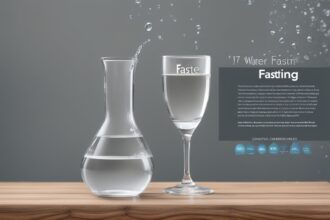What Is Intermittent Hydration Fasting?
Intermittent hydration fasting is a hybrid fasting method where individuals alternate between periods of complete water fasting (no food or caloric beverages) and intentional hydration with water or electrolyte-infused drinks. Unlike traditional water fasting, which involves abstaining from all food and drinks except water for extended periods, this approach focuses on shorter fasting windows with breaks for hydration. The goal is to reap the benefits of fasting while minimizing the risks of dehydration or nutrient depletion. Understanding the intermittent hydration fasting benefits starts with recognizing how this method balances the body’s needs during a fast.
This method can be tailored to individual needs, with fasting windows ranging from 12 to 24 hours, followed by rehydration periods. It’s often seen as a gentler alternative to prolonged water fasting, making it accessible to a wider audience. If you’re new to fasting, consider reading our post on Water Fasting Basics for Beginners to get a foundational understanding before diving into this specific approach.
Key Intermittent Hydration Fasting Benefits for Physical Health
One of the most compelling reasons to try this fasting method is the array of physical health advantages it offers. The intermittent hydration fasting benefits include improved metabolic health, enhanced cellular repair, and better digestive function. During fasting periods, the body enters a state of ketosis, where it burns fat for energy instead of glucose. This can lead to weight loss and improved insulin sensitivity, which are crucial for managing conditions like type 2 diabetes.
Additionally, fasting triggers autophagy, a process where the body cleans out damaged cells and regenerates new ones. This cellular cleanup is linked to reduced inflammation and a lower risk of chronic diseases. By incorporating hydration breaks, this method ensures that the body isn’t overly stressed, maintaining electrolyte balance and preventing fatigue. For more on how fasting impacts metabolism, check out our detailed guide on Fasting and Metabolic Health.
Mental Clarity and Emotional Well-Being
Beyond physical health, intermittent hydration fasting can profoundly impact mental and emotional well-being. Many practitioners report heightened focus, improved mood, and reduced stress levels during fasting periods. This is partly due to the release of brain-derived neurotrophic factor (BDNF), a protein that supports brain health and resilience. The intermittent hydration fasting benefits also extend to reducing symptoms of anxiety and depression for some individuals, as fasting can help regulate hormones like cortisol.
Hydration plays a critical role here, as even mild dehydration can impair cognitive function. By strategically rehydrating, you ensure that your brain remains sharp throughout the fast. If mental health benefits are your primary goal, you might also find value in our article on Fasting for Mental Health and Clarity.
Supporting Weight Management and Detoxification
Weight management is often a primary motivator for starting a fasting regimen, and intermittent hydration fasting excels in this area. By cycling between fasting and hydration, the body can effectively burn stored fat while avoiding the muscle loss sometimes associated with prolonged fasting. This method also supports detoxification by giving the digestive system a break, allowing the liver and kidneys to focus on filtering out toxins.
Unlike crash diets, this approach promotes sustainable fat loss without extreme caloric restriction. The hydration component helps curb hunger pangs, making it easier to stick to the fasting schedule. For additional tips on maintaining a healthy weight through fasting, explore our post on Fasting Strategies for Sustainable Weight Loss.
How to Safely Practice Intermittent Hydration Fasting
While the benefits are enticing, safety is paramount when practicing intermittent hydration fasting. Start with shorter fasting windows (e.g., 12–16 hours) and gradually increase the duration as your body adapts. During hydration breaks, opt for plain water or electrolyte solutions to replenish essential minerals like sodium and potassium. Avoid sugary or caffeinated drinks, as they can disrupt the fasting state.
Listen to your body and stop if you experience dizziness, extreme fatigue, or other adverse symptoms. It’s also wise to consult a healthcare provider before beginning, especially if you have pre-existing medical conditions. For a step-by-step guide on preparing for a fast, refer to our article on Preparing for a Safe Water Fast.
Who Should Avoid Intermittent Hydration Fasting?
While many can enjoy the benefits of this practice, it’s not suitable for everyone. Pregnant or breastfeeding individuals, those with eating disorders, and people with certain medical conditions like kidney disease or low blood pressure should avoid fasting. Children and teenagers should also refrain from fasting unless under strict medical supervision, as their bodies require consistent nutrition for growth.
Always prioritize your health and seek professional advice if you’re unsure whether fasting is right for you. Understanding your personal limits is key to safely reaping the rewards of intermittent hydration fasting.
Disclaimer: This content is for informational purposes only and not a substitute for professional medical advice. Always consult with a qualified healthcare provider before starting any fasting regimen or making significant changes to your diet or lifestyle.
References
- Fasting: Molecular Mechanisms and Clinical Applications – National Institutes of Health
- Intermittent Fasting: Surprising Update – Harvard Health Publishing
- Fasting Diet: Can It Improve My Heart Health? – Mayo Clinic
- Water Fasting: Benefits and Risks – WebMD
- The Effects of Fasting on Metabolism – University of Chicago Press Journals






